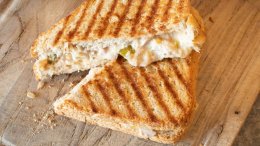Late last year, Montreal food critic, Lesley Chesterman, announced her departure from the Montreal Gazette, marking the end of a 20-year run. At the time, it wasn’t clear who would replace her—or if there would even be a replacement—given the decline in the number of food critics across North America. However, at the end of this June, the Gazette made a surprising announcement: it would be bringing on board not one, but three food writers to form its dining out team.
Joanna Fox, Isa Tousignant, and Amie Watson made the cut, each offering different but extensive journalistic experience. While Fox most directly “replaces” Chesterman with her formal restaurant reviews, Tousignant and Watson bulk out the Gazette’s food coverage by focusing on “best of” lists and trend-based features, respectively. We sat down with the team to get their perspective on their new roles, the future of food writing, Montreal’s food scene and more.
What got each of you into food writing?
IT – I got into food through general lifestyle writing. I started as an arts and culture writer at Hour and became the lifestyle editor there. Then, I was a senior editor at enRoute for four years. I worked at Ricardo for about a year, on and off as a consultant, helping to set up their English magazine when that was still a thing. I got to know Joanna at Ricardo, we worked together for four to five months. When she was approached by the Gazette, she thought I would be good for “list-y” part. I also work for Tourism Montreal as a blogger so I’m on the street a lot already. Doing this was a perfect, natural fit.
AW – I fell in love with food. When I moved to Montreal for my master’s {in music}, I noticed that there wasn’t so much food coverage as there was in Toronto, so I started up my own blog. I also wrote for Midnight Poutine and became their food editor, but I wanted to get into it more seriously, so I started pitching stories to different publications, a little bit for the Gazette, enRoute, etc. Then, I finished my degree and decided I’d rather do food writing full time. I went back to school for journalism and got an internship at enRoute. I’ve since worked for them, Ricardo, MA TV and others, and do TV segments on BT and Global. I also have an app called Fork That that’s like a dating site but for finding the right meal.
JF – I got into hospitality at a young age, working at a food court at 14 or 15, then making my way up to bussing tables in a restaurant, to waitressing and bartending later on. I lived in London, England in my early 20s, working in bars and restaurants there, and that’s where I really got into food. In this one city, there were so many different cuisines from different countries; it kind of blew my mind. From there, I travelled all over the world to experience all this food firsthand, and eventually made my way to Australia, where I did my master’s degree in Gastronomy at Le Cordon Bleu in Adelaide, studying the history and culture of food. After graduating, I pitched a book idea which landed a publisher in Montreal (a best BYOB guide), I came home, and started writing. Shortly after, I started writing for the Montreal Mirror as one of their restaurant critics, and slowly food-related writing jobs trickled in.
How do you like the split, working as a team rather than having a single food critique or writer?
AW – It’s way better. We can also pass ideas off to each other. I sent a draft to Isa the other day to get her feedback. We can also think about overlapping coverage; if she’s doing a list that ties into my feature, they can be published at the same time. It’s a mutually supportive way of handling coverage.
IT – Even when the Gazette had fine dining and affordable columns, all the mid-range places fell between the cracks. That’s where the city can show its colours. The next generation of Chinatown article {that Amie did}; who’s going to tell that story? Not a food critic.
AW – I’ve been waiting to tell those stories for years. There was no outlet for it. Besides the Gazette, where can I pitch? It’s a local story. Living in Montreal, our Chinatown is totally different than Toronto or Vancouver. I hope it’s interesting to readers to understand why.
Do you think that that’s the direction food writing is heading, away from critiques but rather focusing on more investigative journalism and features?
AW – Joanna gives a lot of context, which is important. She has a wordcount that allows her to do that. I don’t think she trends so much into the feature-type writing that I do. That is my niche.
IT – I think that there will always be a need for reviews, recommendations. With Yelp and TripAdvisor, it’s like, “Who is this person, why would I trust them?” There’s always that doubt. Amie, Joanna, and I all have decades of experience eating out and writing as journalists. It’s that expertise that gives us a leg up.
AW – Even if you don’t agree with Joanna’s reviews, Isa’s brunch recommendation, or my thoughts on Chinatown, there’s still credibility. If you don’t agree, you can still make decisions and understand where we are coming from.
What’s your take on the shift away from more formal food critics to more abundant food writers/bloggers? Is this democratization of food writing good or bad?
IT – I like that food gets less pretentious. Writing gets less pretentious. Since the dawn of the blog, everyone is a critic. They are critics of their own type. I really love that. To pretend that there are divisions between one person’s taste and another is a fallacy that we can’t really keep up. The three of us are a trifecta; practically a little magazine section in the paper. You get one topic from a variety of angles, from the political to where to eat tonight, to intense, in-depth taste description.
JF – It depends. If a blogger is getting a free meal and drinks to say a restaurant is amazing, then it’s not really helping anyone decipher the quality of that particular food, not to mention misleading. If someone is genuinely interested in dining out, paying for it, then giving their opinion somewhere online? Sure, why not? Food is something that we all share, and people get really passionate about it, it makes people want to talk. That being said, not everyone is nice, or fair, and I’ve seen restaurateurs get really upset when a blogger critiques them without having all the information right. I have to do my homework, and, to the best of my abilities and knowledge, get my information right. It’s shocking how much misinformation is out there.
Food critics have traditionally been anonymous. Do you get different reception in restaurants now that the info has been made public about your new positions?
AW – No one recognizes me. I don’t get recognized at all. Except maybe through my Resy account.
IT – No, no, not at all. People usually have to meet me three times before they remember me. Apparently I’m not that memorable {laughs}.
JF – There’s no way I could have stayed anonymous. You could already find my picture online, if you searched for it, so when the Gazette wanted to be forthcoming about who I was, I was OK with that. I don’t think many people recognize me when I go out. Plus, I am so new to this gig. I don’t reserve under my name, and if people do realize I’m there and I’m doing a review, it’s probably too late. When I was a waitress here in Montreal, everyone knew what Lesley Chesterman looked like. Maybe it was a secret to readers, but everyone in the industry knew her by sight, guaranteed. So, it didn’t even matter!
How does social media play into your roles as food writers? Is it a mandatory part of the job or something you can pick and choose to do?
AW – It depends on you. If you want to turn yourself into a brand, it is important. I do Instagram for my app, but I don’t do it for me, personally. I always post my stories on Facebook. I also use Facebook to reach out to people for insight for stories. It’s great both as a research tool and also to spread an article afterwards. It’s really important just to get the story out there.
We went out for drinks and some food the other night and I took photos on my phone. Isa didn’t take any at all. It was really just fun and nice to not work all the time. Some younger person will be reading this and rolling their eyes.
IT – If it’s not memorable, you won’t remember it. It’s not the picture that will do it.
JF – I am a pretty private person. I don’t like the idea of other people knowing where I am and what I’m doing. Luckily, as a critic, you can fly below the radar a bit more. I can’t post anything about a restaurant before the review, and if I’m eating out for fun, I’d rather just put my phone away and enjoy a meal because when I work, I have to be on my phone, take pictures, etc. When my articles come out, I post them or share them, but that’s kind of it.
What excites you most about Montreal’s food scene right now?
AW – I think what’s cool is that we’re in a stage where people can afford to open small, chef-run places where you can have a more intimate experience. Wine bar, small plates, locavore type places. When the server comes over, it might be authentic that they actually care about how your day went. They aren’t so swamped with their tables that they can’t say a nice thing. Cooks can afford their rent because we have an affordable city.
JF – Despite how hard it is to open a restaurant here (there are so many obstacles and very little government incentives and breaks, especially for small and medium business), chefs and restaurateurs are still doing it, all the time. Not only that, but they are doing really cool things, opening places that are several things at once, like along with being a restaurant or wine bar, they also sell local wine or produce, coffee, even books and merch. It’s an interesting strategy in trying to be successful: get people in the door with for one thing, and then get them to stay and spend on other stuff. Maybe it’s just a reflection of our times.
IT – Both the old, undiscovered and the new takes excite me. I’m on brownies next and I’m thinking about those now. I know that whatever I’m looking at, there are always amazing places to discover both new and old.













